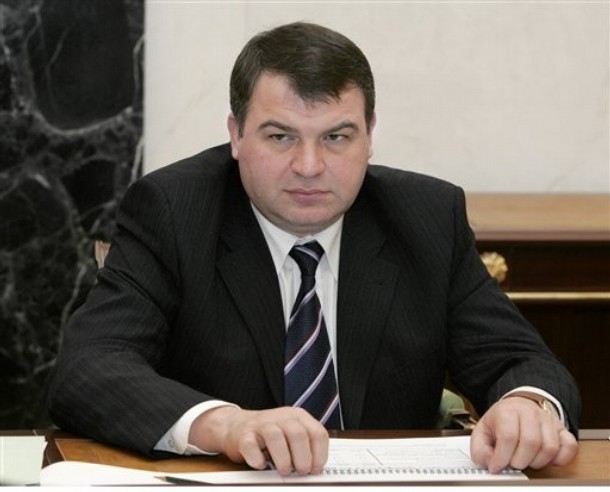
Prosecutors Allege Large-Scale Corruption in Defense Ministry
Prosecutors Allege Large-Scale Corruption in Defense Ministry
Russia’s Investigation Committee (Slyedstvenny Kommitet Rossye—SKR) spokesman Vladimir Markin stunned Moscow on October 25 by publicly accusing the defense ministry–controlled holding company “Oboronservis” of corruption and of defrauding the federal budget of “over three billion rubles” ($100 million). According to Markin, the offices of “Oboronservis” are being searched by investigators, and two arrests have been made, though the names of the arrested have not yet been disclosed. Markin announced that Elena Vasilyeva (33)—former chief of the Defense Ministry Real Estate department and a close associate of Defense Minister Anatoly Serdyukov—is also a target of the ongoing investigation. It has been reported that Serdyukov personally arrived at the “Oboronservis” offices while they were being searched. Moscow is full of rumors that Serdyukov may be immanently ousted (Interfax, October 25).
“Oboronservis” was formed by a presidential decree (ukaz) in September 2008 as a key part of Serdyukov’s radical military reform plan. According to “Oboronservis” CEO (general director) Sergei Khursevich, the main idea was to privatize and “outsource” most of the maintenance work and logistic support of troops and military hardware, drastically cutting costs and increasing quality (https://function.mil.ru, September 15). Military garrison trade outlets, military mass media, armament repairs, garrison town dwellings maintenance, providing of troops with food and clothing, maintaining military run farms—all these activities were included under the umbrella of “Oboronservis” and essentially privatized. From 2008 until 2011, Serdyukov was the chairman of the board of “Oboronservis,” replaced at present in that position by the retired chief of Russia’s military intelligence service (Glavnoye Razvedovatel’noye Upravlenie—GRU) Colonel General Alexander Shlyakhturov. The SKR officially lists “Oboronservis” as a “defense ministry–controlled company,” but the ministry of defense itself insists it is “independent,” working under contract (RIA Novosti, October 25).
Markin has accused “Oboronservis” of defrauding the state through the privatization and subsequent sale at knock down prices of valuable real estate in Moscow and the Krasnodar Kray seafront (Interfax, October 25). A retired colonel and former defense ministry spokesman, Viktor Baranetz, in a radio interview accused Serdyukov of corruption and nepotism. Serdyukov was chief of Russia’s tax service from 2004 to 2007. After becoming defense minister in 2007, Serdyukov promoted a number of former tax service personnel (mostly women) to top defense ministry positions, controlling finance, military education, housing and real estate. These appointments were disliked by many in the traditionally male-dominated defense ministry; Baranetz described these women as “a band of Serdyukov’s concubines.” He also declared that “the SKR will find misappropriations worth not 3 billion, but 30 billion rubles ($1 billion) if [it] honestly investigates.” According to Baranetz, the Kremlin is fed up with Serdyukov and “an order was given to attack him to make a pretext to fire him” (www.bfm.ru/realty/2012/10/25/). A well-connected and usually well-informed tabloid-style web resource has alleged that investigators arriving with a search warrant at Vasilyeva’s apartment in Moscow in the morning of October 25 discovered Serdyukov there in person (https://lifenews.ru, October 25).
In the coming three years, Russian defense spending will grow substantially from 1.9 trillion rubles ($67 billion) in 2012 to three trillion rubles ($100 billion) in 2015, reaching almost four percent of national GDP. Together with other national security budgetary items, this would add up to more than six percent of GDP. This surge of defense and national security spending, already approved last week by the Duma, is meant to restore Russia’s great military state status and allow it to spread its “sphere of influence” (RIA Novosti, October 17). Much of that money would be disbursed through “Oboronservis.” Serdyukov’s “outsourcing” into friendly private hands of substantial budgetary funds as well as defense ministry real estate privatization schemes have clearly made him lots of enemies within the ruling Russian elite. The chief military prosecutor’s office has for years been in conflict with the defense ministry. Chief military prosecutor Alexsander Savenkov was ousted in 2006 after an acute conflict with the Russian Ministry of Defense, but his successor Sergei Fridinsky continued the tradition of opposition. Today Fridinsky has publicly supported the SKR investigation, accusing defense ministry officials of obstructing justice by not cooperating with investigations, and he promised that “the scheme of misappropriation of state funds will be broken and the guilty will be brought to justice” (Interfax, October 25).
President Vladimir Putin has many times publicly expressed anxiety about the possibility that the large extra defense spending, intended to rearm and reform the Russian military could be misappropriated. “This is big money and it is impossible to add more—it must be spent wisely,” Putin has stated (www.kremlin.ru, July 30). It is clear the present highly public disclosure of gross top-level corruption and misappropriation in the defense ministry that was revealed by the SKR was approved by the Kremlin, and this may reflect Putin’s underlying fear that his dream of restoring Russia’s military and imperial greatness may be shattered by Russian traditional corruption. The present public defense ministry anti-corruption campaign could be intended by the Kremlin to teach a lesson to the officials empowered with disbursing increased defense spending, thus trimming their appetites. Actually dismissing Serdyukov is a different story: he is Putin’s personally appointed cohort and replacing him with someone new in the defense ministry would bring instability and large-scale personnel change to a critically important “power ministry” at a badly chosen time.
Serdyukov seems to be in serious trouble, but his ouster is still not inevitable. The present anti-corruption drive is aimed at middle-tier officialdom and may end on that level. In Moscow, only the will of President Putin, and not public opinion at all, decide the fate of ministers and other top-level officials. In this system of government, publicly disgraced figures are sometimes more eligible for top promotion, since their personal loyalty is better assured; and the tsar in the Kremlin becomes their only guarantee of further wellbeing and immunity from justice.

